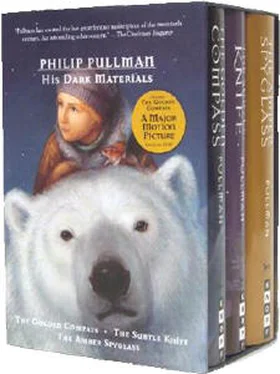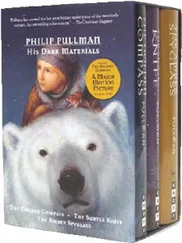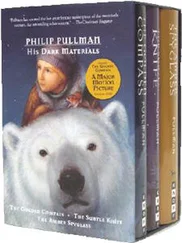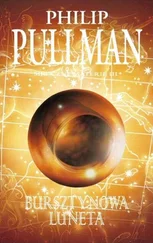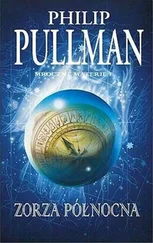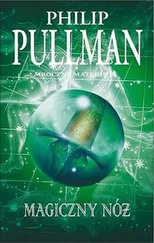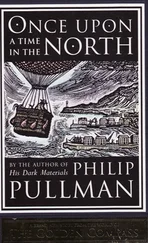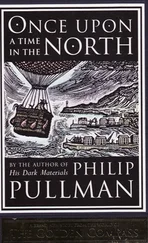Then came a screech, not human, not animal, but worse than either, and he knew it was that loathsome monkey. By that time he'd gotten most of the window closed, but there was still a small gap at the level of his chest. And then he leaped back, because into that gap there came a small furry golden hand with black fingernails, and then a face — a nightmare face. The golden monkey's teeth were bared, his eyes glaring, and such a concentrated malevolence blazed from him that Will felt it almost like a spear.
Another second and he would have been through, and that would have been the end. But Will was still holding the knife, and he brought it up at once and slashed left, right, across the monkey's face — or where the face would have been if the monkey hadn't withdrawn just in time. That gave Will the moment he needed to seize the edges of the window and press them shut.
His own world had vanished, and he was alone in the moonlit parkland in Cittagazze, panting and trembling and horribly frightened.
But now there was Lyra to rescue. He ran back to the first window, the one he'd opened into the shrubbery, and looked through. The dark leaves of laurels and holly obscured the view, but he reached through and thrust them aside to see the side of the house clearly, with the broken study window sharp in the moonlight.
As he watched, he saw the monkey leaping around the corner of the house, scampering over the grass with the speed of a cat, and then he saw Sir Charles and the woman following close behind. Sir Charles was carrying a pistol. The woman herself was beautiful — Will saw that with shock — lovely in the moonlight, her brilliant dark eyes wide with enchantment, her slender shape light and graceful; but as she snapped her fingers, the monkey stopped at once and leaped up into her arms, and he saw that the sweet-faced woman and the evil monkey were one being.
But where was Lyra?
The adults were looking around, and then the woman put the monkey down, and it began to cast this way and that on the grass as if it were scenting or looking for footprints. There was silence from all around. If Lyra was in the shrubbery already, she wouldn't be able to move without making a noise, which would give her away at once.
Sir Charles adjusted something on his pistol with a soft click: the safety catch. He peered into the shrubbery, seeming to look directly at Will, and then his eyes traveled on past.
Then both of the adults looked to their left, for the monkey had heard something. And in a flash it leaped forward to where Lyra must be, and a moment later it would have found her —
And at that moment the tabby cat sprang out of the shrubbery and onto the grass, and hissed.
The monkey heard and twisted in midair as if with astonishment, though he was hardly as astonished as Will himself. The monkey fell on his paws, facing the cat, and the cat arched her back, tail raised high, and stood sideways on, hissing, challenging, spitting.
And the monkey leaped for her. The cat reared up, slashing with needle-paws left and right too quickly to be seen, and then Lyra was beside Will, tumbling through the window with Pantalaimon beside her. And the cat screamed, and the monkey screamed, too, as the cat's claws raked his face; and then the monkey turned and leaped into Mrs. Coulter's arms, and the cat shot away into the bushes of her own world and vanished.
And Will and Lyra were through the window, and Will felt once again for the almost intangible edges in the air and pressed them swiftly together, closing the window all along its length as through the diminishing gap came the sound of feet among twigs and cracking branches —
And then there was only a hole the size of Will's hand, and then it was shut, and the whole world was silent. He fell to his knees on the dewy grass and fumbled for the alethiometer.
«Here,» he said to Lyra.
She took it. With shaking hands he slid the knife back into its sheath. Then he lay down trembling in all his limbs and closed his eyes, and felt the moonlight bathing him with silver, and felt Lyra undoing his bandage and tying it up again with delicate, gentle movements.
«Oh, Will,» he heard her say. «Thank you for what you done, for all of it….»
«I hope the cat's all right,» he muttered. «She's like my Moxie. She's probably gone home now. In her own world again. She'll be all right now.»
«You know what I thought? I thought for a second she was your daemon. She done what a good daemon would have done, anyway. We rescued her and she rescued us. Come on, Will, don't lie on the grass, it's wet. You got to come and lie down in a proper bed, else you'll catch cold. We'll go in that big house over there. There's bound to be beds and food and stuff. Come on, I'll make a new bandage, I'll put some coffee on to cook, I'll make some omelette, whatever you want, and we'll sleep…. We'll be safe now we've got the alethiometer back, you'll see. I'll do nothing now except help you find your father, I promise….»
She helped him up, and they walked slowly through the garden toward the great white-gleaming house under the moon.
Lee Scoresby disembarked at the port in the mouth of the Yenisei River, and found the place in chaos, with fishermen trying to sell their meager catches of unknown kinds of fish to the canning factories; with shipowners angry about the harbor charges the authorities had raised to cope with the floods; and with hunters and fur trappers drifting into town unable to work because of the rapidly thawing forest and the disordered behavior of the animals.
It was going to be hard to make his way into the interior along the road, that was certain; for in normal times the road was simply a cleared track of frozen earth, and now that even the permafrost was melting, the surface was a swamp of churned mud.
So Lee put his balloon and equipment into storage and with his dwindling gold hired a boat with a gas engine. He bought several tanks of fuel and some stores, and set off up the swollen river.
He made slow progress at first. Not only was the current swift, but the waters were laden with all kinds of debris: tree trunks, brushwood, drowned animals, and once the bloated corpse of a man. He had to pilot carefully and keep the little engine beating hard to make any headway.
He was heading for the village of Grumman's tribe. For guidance he had only his memory of having flown over the country some years before, but that memory was good, and he had little difficulty in finding the right course among the swift-running streams, even though some of the banks had vanished under the milky-brown floodwaters. The temperature had disturbed the insects, and a cloud of midges made every outline hazy. Lee smeared his face and hands with jimsonweed ointment and smoked a succession of pungent cigars, which kept the worst at bay.
As for Hester, she sat taciturn in the bow, her long ears flat against her skinny back and her eyes narrowed. He was used to her silence, and she to his. They spoke when they needed to.
On the morning of the third day, Lee steered the little craft up a creek that joined the main stream, flowing down from a line of low hills that should have been deep under snow but now were patched and streaked with brown. Soon the stream was flowing between low pines and spruce, and after a few miles they came to a large round rock, the height of a house, where Lee drew in to the bank and tied up.
«There was a landing stage here,» he said to Hester. «Remember the old seal hunter in Nova Zembla who told us about it? It must be six feet under now.»
«I hope they had sense enough to build the village high, then,» she said, hopping ashore.
No more than half an hour later he laid his pack down beside the wooden house of the village headman and turned to salute the little crowd that had gathered. He used the gesture universal in the north to signify friendship, and laid his rifle down at his feet.
Читать дальше
